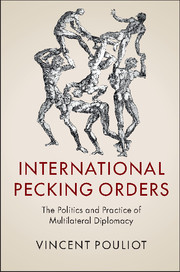Book contents
- Frontmatter
- Contents
- List of figures
- List of tables
- Preface and acknowledgments
- List of abbreviations
- Introduction: All the world's a stage
- Part I Situations
- 1 The politics of multilateral diplomacy
- 2 A practice theory of social stratification
- Part II Dispositions
- Part III Relations
- Part IV Positions
- Conclusion: The “miracle” of multilateral pecking orders
- Appendix: Research design, methods and data
- References
- Index
1 - The politics of multilateral diplomacy
from Part I - Situations
Published online by Cambridge University Press: 05 March 2016
- Frontmatter
- Contents
- List of figures
- List of tables
- Preface and acknowledgments
- List of abbreviations
- Introduction: All the world's a stage
- Part I Situations
- 1 The politics of multilateral diplomacy
- 2 A practice theory of social stratification
- Part II Dispositions
- Part III Relations
- Part IV Positions
- Conclusion: The “miracle” of multilateral pecking orders
- Appendix: Research design, methods and data
- References
- Index
Summary
This chapter sets the stage for the book by delineating its main object: multilateral diplomacy and more specifically permanent representation to IOs. In the first section, I argue that multilateral diplomacy is an increasingly pervasive set of practices in the twenty-first century. In recent decades, global governance has “multilateralized,” so to speak, with significant political consequences. As part of this trend, the practice of permanent representation to IOs has established itself as a major form of global governance. In the second section of the chapter, I discuss the relationship between sovereign equality and multilateralism, which is often misunderstood in both academia and policy circles. From the practitioner's point of view, the founding myth of diplomacy is premised on egalitarian rituals that euphemize pecking order dynamics. Among liberal scholars, there is an echoing belief that multilateralism reinforces sovereign equality. In line with realist and critical IR theory, I argue instead that multilateral diplomacy is shot through with power politics. In the final section, I show how a practice theory of international pecking orders builds on, and improves upon, the new research agenda on “informal governance” in multilateral organizations.
Multilateralism: evolution and forms
At the most basic level, multilateralism is “the practice of coordinating national policies in groups of three or more states.” This nominal definition, however, reduces the practice to a strict question of numbers. Ruggie's seminal study adds a qualitative dimension conceiving of multilateralism as “an institutional form which coordinates relations among three or more states on the basis of ‘generalized’ principles of conduct.” In this influential statement, multilateralism rests on a certain degree of institutionalization, which renders the application of rules as systematic instead of ad hoc. Still missing in my view, though, is the active side of multilateralism – the fact that it is a way of performing world politics that differs from others. Building on Ruggie, I define multilateralism as “a global governance practice characterized by an inclusive, institutionalized and principled form of political dialogue.” This formulation helps differentiate multilateral diplomacy from more exclusive forms (unilateral, bilateral or “minilateral”), from ad hoc and issue-specific configurations, as well as from Concert-type arrangements, which set certain self-appointed participants above the others.
The multilateralization of world politics
Multilateralism has come of age – to the point that it now “incontestably dominates international life,” according to two prominent observers.
- Type
- Chapter
- Information
- International Pecking OrdersThe Politics and Practice of Multilateral Diplomacy, pp. 27 - 47Publisher: Cambridge University PressPrint publication year: 2016



